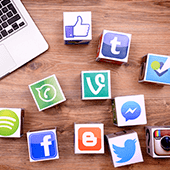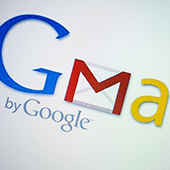Posted on Monday May 14, 2018 | twitter, social media, pr, pinterest, google, facebook, adwords
 As a startup business owner, you may think social media isn't worth the effort because no one knows about your business. You may have dabbled in Twitter, Facebook, or LinkedIn and seen minimal (if any) results. What can a business owner with a new brand/product do? Well, it turns out quite a lot. And to prove it, here are tips everyone can learn from.
As a startup business owner, you may think social media isn't worth the effort because no one knows about your business. You may have dabbled in Twitter, Facebook, or LinkedIn and seen minimal (if any) results. What can a business owner with a new brand/product do? Well, it turns out quite a lot. And to prove it, here are tips everyone can learn from.

Posted on Monday May 14, 2018 | security
An anonymous reader quotes a report from Wired: The ubiquitous email encryption schemes PGP and S/MIME are vulnerable to attack, according to a group of German and Belgian researchers who posted their findings on Monday. The weakness could allow a hacker to expose plaintext versions of encrypted messages -- a nightmare scenario for users who rely on encrypted email to protect their privacy, security, and safety. The weakness, dubbed eFail, emerges when an attacker who has already managed to intercept your encrypted emails manipulates how the message will process its HTML elements, like images and multimedia styling. When the recipient gets the altered message and their email client -- like Outlook or Apple Mail -- decrypts it, the email program will also load the external multimedia components through the maliciously altered channel, allowing the attacker to grab the plaintext of the message. The eFail attack requires hackers to have a high level of access in the first place that, in itself, is difficult to achieve. They need to already be able to intercept encrypted messages, before they begin waylaying messages to alter them. PGP is a classic end-to-end encryption scheme that has been a go-to for secure consumer email since the late 1990s because of the free, open-source standard known as OpenPGP. But the whole point of doing the extra work to keep data encrypted from the time it leaves the sender to the time it displays for the receiver is to reduce the risk of access attacks -- even if someone can tap into your encrypted messages, the data will still be unreadable. eFail is an example of these secondary protections failing.

Posted on Friday May 11, 2018 | web and cloud, productivity, new gmail, google, email
 The first thing you'll notice in the new Gmail for web is its uncluttered look, but there's plenty more to be excited about. Greater security, easy-to-use sidebar apps and inline buttons, and more have been added to improve Gmail users' experience. Here's a quick rundown of all the features you need to start using now.
The first thing you'll notice in the new Gmail for web is its uncluttered look, but there's plenty more to be excited about. Greater security, easy-to-use sidebar apps and inline buttons, and more have been added to improve Gmail users' experience. Here's a quick rundown of all the features you need to start using now.

Posted on Thursday May 10, 2018 | Announcements
Catalin Cimpanu, writing for BleepingComputer: A survey compiled last month at the RSA security conference reveals that most companies are still behind with proper security practices, and some of them even intentionally ignore security flaws for various reasons ranging from lack of time to lack of know-how. The survey, which compiled answers from 155 security professionals from the companies present at the RSA conference, revealed that only 47% of organizations patch vulnerabilities as soon as they are known. Most worrisome is that some companies wait quite some time before applying patches, exposing their IT infrastructure to attacks. More precisely, 16% wait for one month, while 8% said they only apply patches once or twice a year.

Posted on Thursday May 10, 2018 | storage capacity, security, data recovery, cloud backup, business continuity, budget
 It is always better to be safe than sorry. And given the fact that files can disappear or be corrupted in an instant, small businesses need robust data backup systems in place. Without one, you could very well lose lots of money and have your hard-earned reputation irrevocably damaged.
It is always better to be safe than sorry. And given the fact that files can disappear or be corrupted in an instant, small businesses need robust data backup systems in place. Without one, you could very well lose lots of money and have your hard-earned reputation irrevocably damaged.

Posted on Wednesday May 09, 2018 | Programming
Microsoft's text editing app, Notepad, which has been shipping with Windows since version 1.0 in 1985, now supports line endings in text files created on Linux, Unix, Mac OS, and macOS devices. "This has been a major annoyance for developers, IT Pros, administrators, and end users throughout the community," Microsoft said in a blog post today. The Register reports: Notepad previously recognized only the Windows End of Line (EOL) characters, specifically Carriage Return (CR, r, 0x0d) and Line Feed (LF, n, 0x0a) together. For old-school Mac OS, the EOL character is just Carriage Return (CR, r, 0x0d) and for Linux/Unix it's just Line Feed (LF, n, 0x0a). Modern macOS, since Mac OS X, follows the Unix convention. Opening a file written on macOS, Mac OS, Linux, or Unix-flavored computers in Windows Notepad therefore looked like a long wall of text with no separation between paragraphs and lines. Relief arrives in the current Windows 10 Insider Build. Notepad will continue to output CRLF as its EOL character by default. It's not changing its stripes entirely. But it will retain the formatting of the files it opens so users will be able to view, edit and print text files with non-Windows line ends. Microsoft has thoughtfully provided an out for Windows users counting on the app's past inflexibility: the new behavior can be undone with a registry key change.
